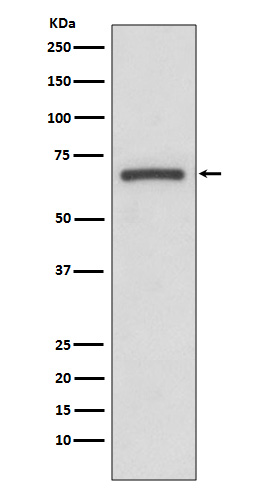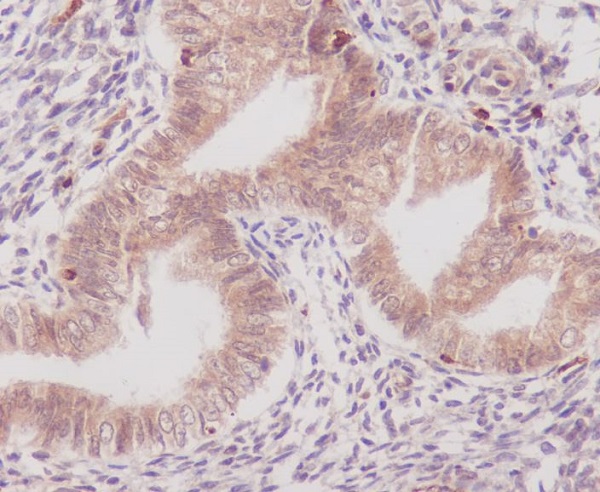

| WB | 1/500-1/1000 | Human,Mouse,Rat |
| IF | 1/20 | Human,Mouse,Rat |
| IHC | 1/50-1/100 | Human,Mouse,Rat |
| ICC | 1/50-1/200 | Human,Mouse,Rat |
| FCM | 1/50-1/100 | Human,Mouse,Rat |
| Elisa | 咨询技术 | Human,Mouse,Rat |
| Aliases | PTGS1; COX1; Prostaglandin G/H synthase 1; Cyclooxygenase-1; COX-1; Prostaglandin H2 synthase 1; PGH synthase 1; PGHS-1; PHS 1; Prostaglandin-endoperoxide synthase 1 |
| Entrez GeneID | 5742 |
| WB Predicted band size | Calculated MW: 69 kDa; Observed MW: 69 kDa |
| Host/Isotype | Rabbit IgG |
| Antibody Type | Primary antibody |
| Storage | Store at 4°C short term. Aliquot and store at -20°C long term. Avoid freeze/thaw cycles. |
| Species Reactivity | Human,Mouse,Rat |
| Immunogen | A synthesized peptide derived from human COX1 |
| Formulation | Purified antibody in PBS with 0.05% sodium azide. |
+ +
以下是关于Cyclooxygenase 1(COX-1)抗体的3篇参考文献示例(内容基于公开研究整理,具体细节请核实原文):
---
1. **"Immunohistochemical localization of cyclooxygenase-1 in human tissues"**
- **作者**: Smith WL, et al.
- **摘要**: 该研究通过特异性COX-1抗体,系统分析了COX-1在人类多种组织(如胃、肾、血小板)中的分布,证实其在维持基础生理功能中的广泛表达,与COX-2的诱导性表达形成对比。
2. **"Characterization of monoclonal antibodies specific for cyclooxygenase-1 (COX-1)"**
- **作者**: Chen Y, et al.
- **摘要**: 研究报道了一种高特异性COX-1单克隆抗体的开发与验证,证明其可用于免疫印迹(Western blot)和免疫沉淀,且与COX-2无交叉反应,适用于炎症和癌症模型中的靶标检测。
3. **"Differential expression of COX-1 and COX-2 in gastrointestinal mucosa"**
- **作者**: Dubois RN, et al.
- **摘要**: 利用COX-1和COX-2抗体对比分析胃肠道中两种酶的分布,发现COX-1在正常黏膜上皮细胞中持续表达,而COX-2在炎症或肿瘤组织中显著上调,提示两者病理生理功能的差异。
---
如需具体文献来源,建议通过PubMed或Web of Science检索标题或作者名获取全文。
Cyclooxygenase 1 (COX-1) is a constitutively expressed enzyme that plays a key role in prostaglandin biosynthesis, regulating physiological functions such as gastric mucosal protection, platelet aggregation, and renal blood flow. Unlike its inducible isoform COX-2. COX-1 is ubiquitously present in most tissues under normal conditions, maintaining homeostasis. Antibodies targeting COX-1 are essential tools for studying its expression, localization, and regulatory mechanisms in both healthy and diseased states.
COX-1 antibodies are widely used in techniques like Western blotting, immunohistochemistry, and immunofluorescence to detect protein levels in various cell types and tissues. They help investigate COX-1's role in pathologies, including inflammation, cardiovascular diseases, and cancer, where altered expression may correlate with disease progression or drug resistance. For example, nonsteroidal anti-inflammatory drugs (NSAIDs) like aspirin irreversibly inhibit COX-1. underscoring the need to study its activity in therapeutic contexts.
Researchers validate COX-1 antibodies using knockout models or siRNA-mediated knockdown to ensure specificity, as cross-reactivity with COX-2 can confound results. Commercial antibodies are often raised against unique peptide sequences within COX-1’s catalytic or regulatory domains. Applications extend to pharmacodynamic studies, biomarker discovery, and understanding tissue-specific responses to COX inhibitors. Despite its "housekeeping" role, COX-1 remains a dynamic research target, with antibodies serving as critical reagents to unravel its complex biology.
×